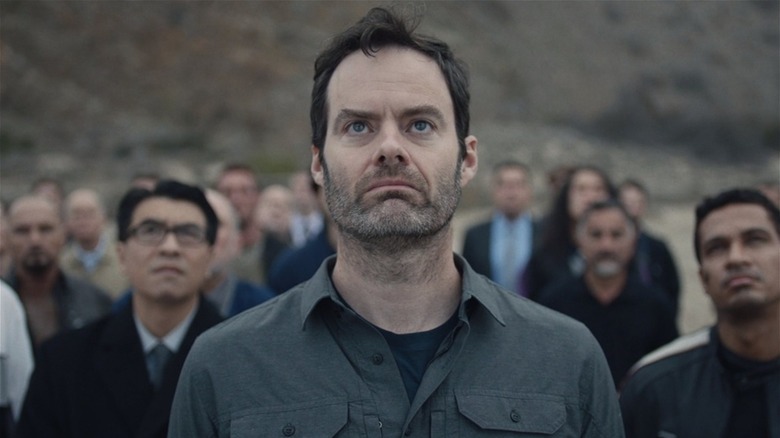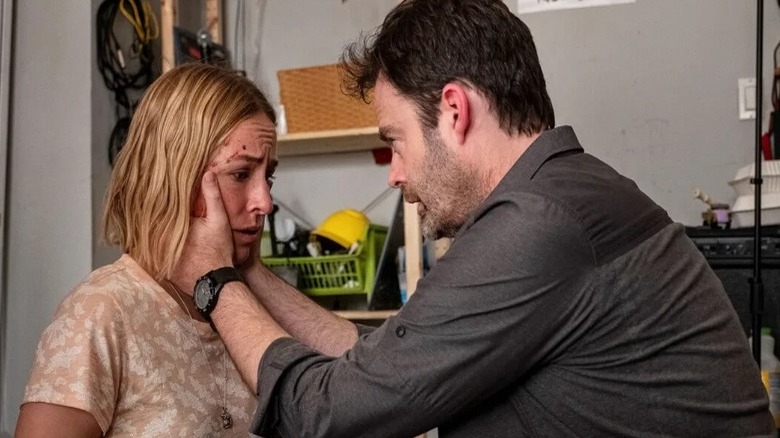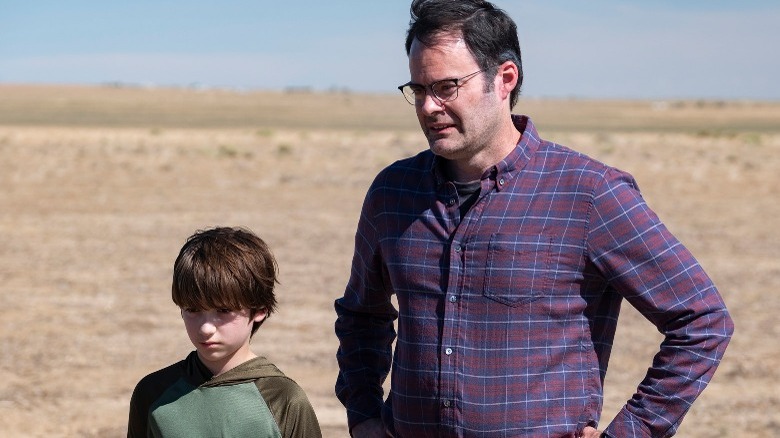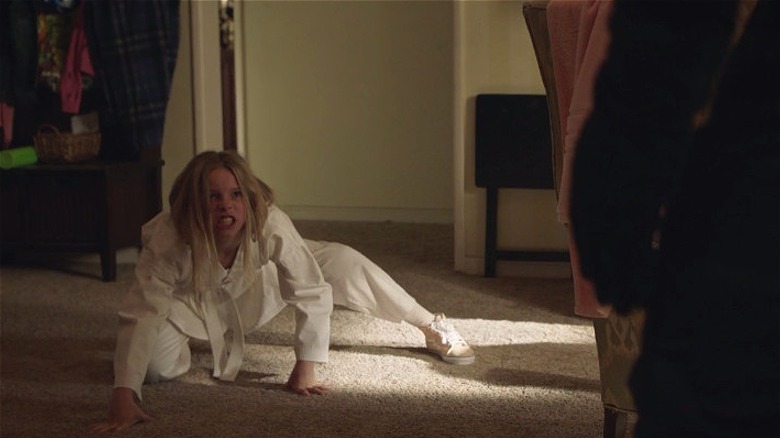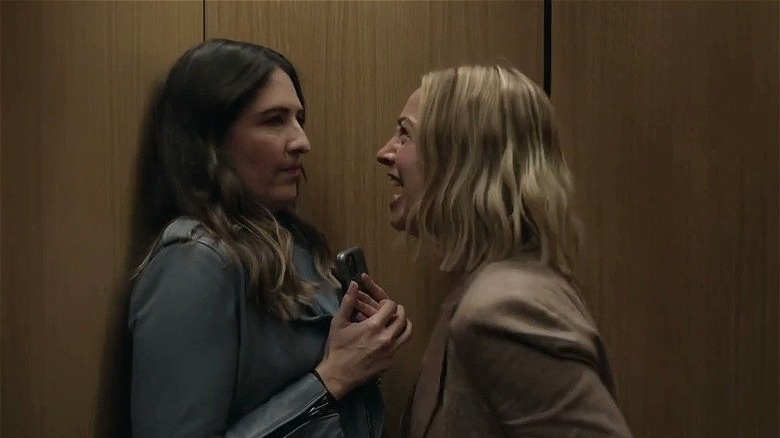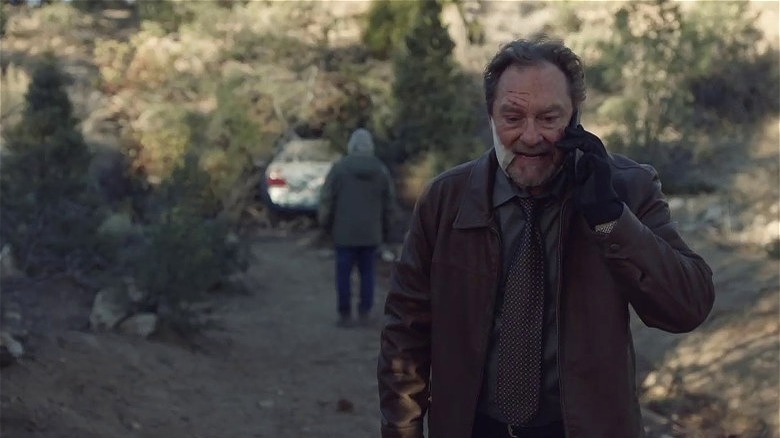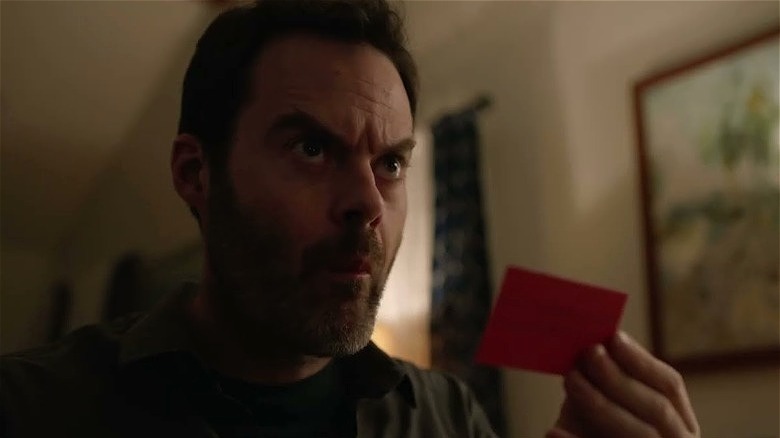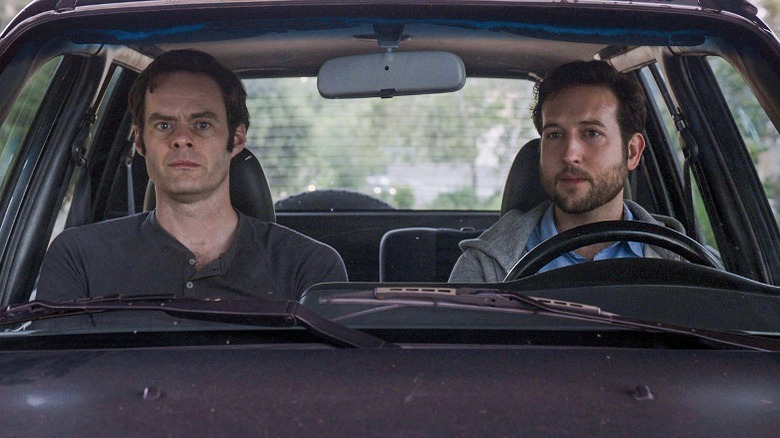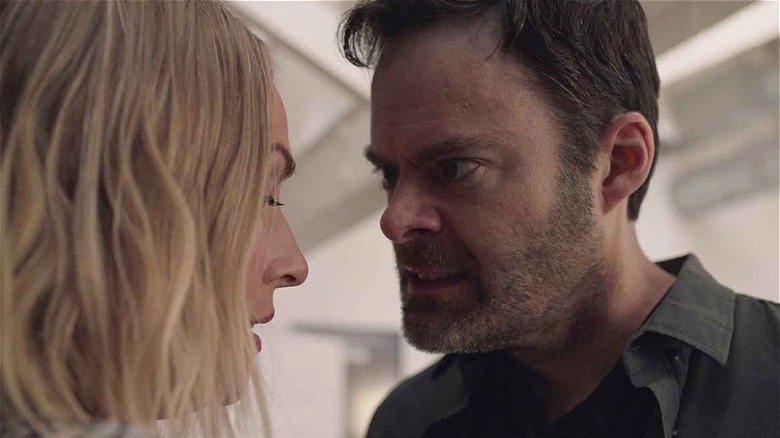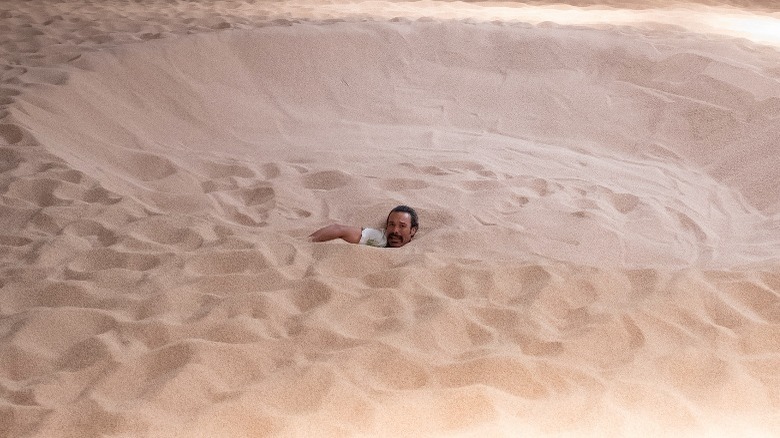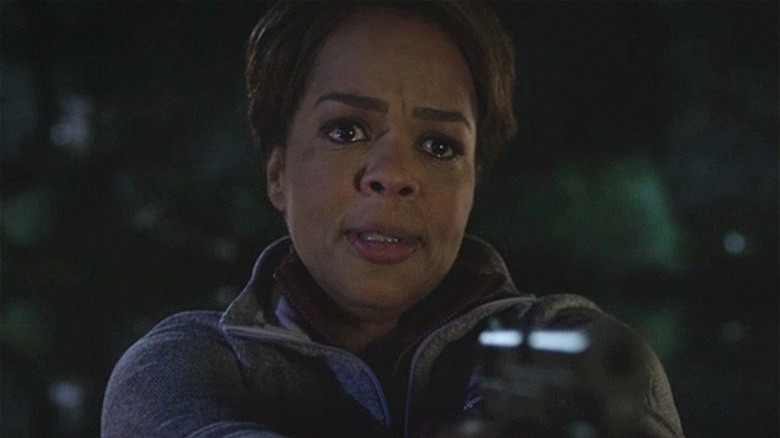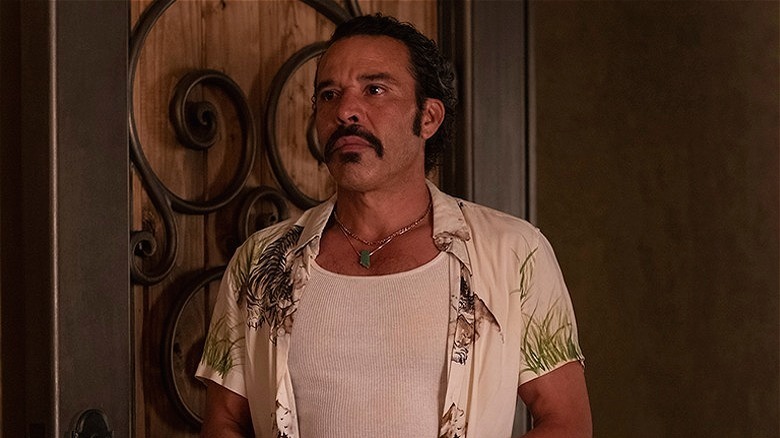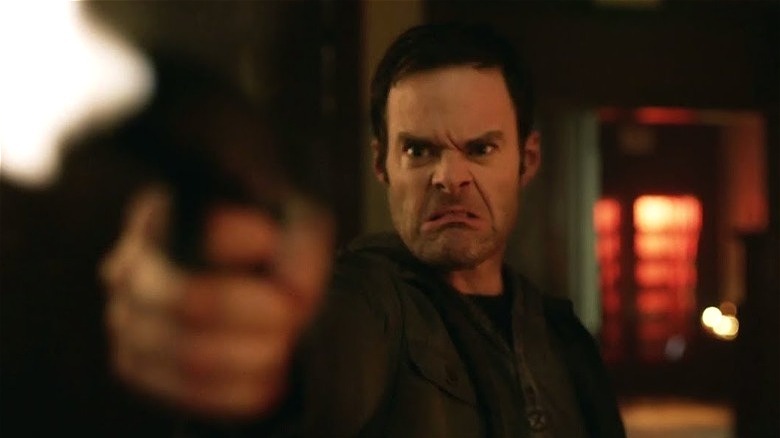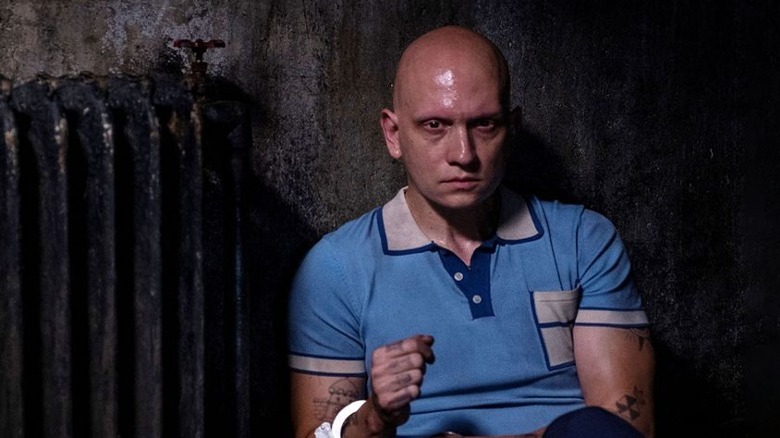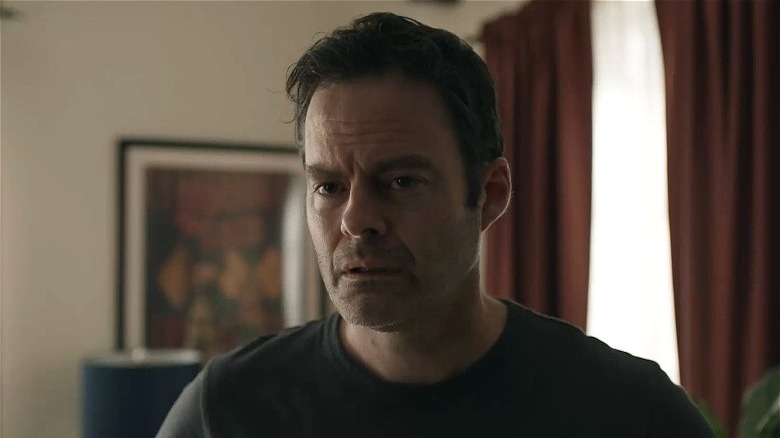The 14 Most Shocking Moments In Barry
"Barry" has been one of the stealthiest TV hits of recent years. Part blacker-than-black comedy, part grisly crime thriller, it ranks along with "Breaking Bad," "Mr Inbetween" and "Ozark" as one of the most refreshing, constantly surprising dramas of recent years. The story of a hitman (Bill Hader) who joins an acting class, quickly transcended this comedy premise and turned into a brilliantly observed character study. It features career-defining performances from the likes of Anthony Carrigan and Sarah Goldberg while giving veteran actors like Stephen Root and Henry Winkler an opportunity to shine in roles that really brought out some of their best work.
Co-creator/star/sometime director Hader ensured the series was never predictable, consistently taking risks and narrative gambits that made "Barry" a supremely tense show to watch at times. Now, with the dust settled and having recovered from the devastating ending, is as good a time as any to rank the series' most shocking moments.
As befitting a show about an assassin, a fair few characters died. So, be advised, this is a spoiler-heavy list.
Sally kills a biker
As the third season draws to a close, all the walls of Barry's existence close in drastically, leading to this scene, where his personal and professional lives converge in a riveting sequence. Up until this point, Barry somehow kept his girlfriend Sally (Sarah Goldberg) away from his work, but this scene draws her perilously into his orbit.
The violence is abrupt and without fanfare; Sally tries to convince Barry to intimidate her rival Natalie (D'Arcy Carden) and when Barry stands up to admonish her, the one surviving member of the biker gang (Anthony Molinari) is shown standing in the doorway behind him. His presence is revealed in such a matter-of-fact way, it's genuinely unsettling, as is what follows.
Immediately incapacitating Barry, he begins strangling Sally in an achingly prolonged sequence — it genuinely seems like she might die. She looks around to grab anything she can use and eventually finds the knife Barry dropped earlier. She stabs him in the neck (in one gruesome detail, the blade sticks out of his eye) before beating him to death with a baseball bat.
By this stage in the series, we have become accustomed to the numerous violent set-pieces, but this scene hits differently. This is a raw, brutal death scene, and shows that violence can spring from nowhere — and anyone.
The time jump
From the very start of "Barry," Bill Hader has deployed dream sequences to great effect, from envisaging his idyllic future with Sally to the increasingly disturbing visions he has of the afterlife. You can be forgiven, then, for assuming that the extreme time jump in Season 4 is yet another dream sequence, and Hader clearly plays on this assumption.
In an episode where all the principal characters are in a position to face off against one another, Hader jumps ahead eight years to Barry, Sally, and their son John (Zachary Golinger) living a quiet, mundane existence in a remote town far away from their former lives.
It creates an exceptionally disorienting effect, as we are constantly questioning whether this is real or not. It's only once we see the characters back in L.A. right at the end of the episode, that we realize that this is indeed reality. It's an incredibly bold gambit, and one that makes perfect sense in retrospect. Eight years is the perfect amount of time for Fuches (Stephen Root) to finish out his prison sentence and for NoHo Hank (Anthony Carrigan) to consolidate his position as the head of the Chechen mafia. It sets the stakes for the rest of the series perfectly, but that initial cut shocks the system.
Lily
"Ronny/Lily" might be the best episode of "Barry." It's certainly the funniest, as Barry attempts to take out a contract who is, unbeknownst to him, a Taekwondo champion. After getting roundly beaten by Ronny (Daniel Bernhardt), he somehow manages to get the upper hand, crushing his contract's windpipe and leaving him for dead. Just as he prepares to walk out the door, Ronny's daughter Lily (Jessie Giacomazzi) arrives home. And rather than the traumatized child he expected, she proves to be just as much of a threat as her father.
Positively feral, she launches herself at an unassuming Barry like a miniature demon, complete with guttural snarls. It's a terrifying fight scene, as she hardcore attacks him, swinging on lamps, vaulting across the kitchen counter, and making use of any item at her disposal to dispatch the hitman, throwing cans at him and even managing to stab him with a kitchen knife. It's a scene made all the more disturbing by the fact "Barry" never explains Lily's near-supernatural abilities. That lends the episode an otherworldly quality, along with a great deal of humor.
In her final moments on screen, Lily lets loose an unearthly roar and runs into the night. We totally vibe with Fuches, who screams: "What are you!?"
Sally in the elevator
Not all shocking scenes require violence. In some cases, it's just an instance of pushing someone to the breaking point. Take, for instance, Sally, who is told her show will be canceled due to the algorithm saying so, only to witness her friend-turned-P.A. Natalie leading a writers' room for her own show, with a very similar premise.
When they find themselves alone in an elevator, Sally unloads on her former pal in an expletive-filled diatribe. Only a couple of episodes earlier, Natalie comforted Sally when she hit her lowest ebb. It's a culmination of Sally's entire story arc for this season. The way this scene is shot resembles a horror film, with Natalie framed alone in the elevator until it grinds to a sudden halt, and it's revealed that Sally has been there the entire time. Sarah Goldberg is incredible in this moment, unleashing all the pent-up anger Sally has felt since being chewed up and spat out by the unforgiving television system, and mimicking Barry's abusive behavior as she violently intimidates Natalie, punching the wall beside her and screaming inches away from her face.
Fuches tortures Gene
When talking about shocking scenes, the impulse is to pick ones that make you pop out of your seat, like a jump scare. Just as potent though, are the subtler shocks that make you catch your breath or send a chill down your spine. The moment where Fuches coldly leads acting teacher Gene Cousineau (Henry Winkler) to his girlfriend's body ranks as one such example.
Fuches might be the most despicable character in the whole series. Entirely self-serving, spineless, and petty, he fails to bring Barry down himself, so he takes the most malicious route to get to him. Adopting his well-used pseudonym of private investigator Kenneth Goulet, he lures Gene into the woods to "stumble across" Gina's body, then calls the cops pretending to be Gene, tearfully confessing to the murder, and announcing that he intends to kill himself.
The shot of an utterly broken Gene gazing at the body of the woman he loves, with Fuches standing at his shoulder like a demon, delivers the season's most chilling tableau. The final moment might not be a shock, specifically, but our jaws dropped to the floor as Fuches calmly raises his gun to Gene's head as the screen fades to black. Maybe the best cliffhanger the show ever attempted.
Barry gets poisoned
Taking Barry's attempted self-growth as a personal betrayal, Fuches launches a campaign of revenge against Barry that's more insidious and petty than coming at him guns blazing. He simply approaches the grieving relatives of some of Barry's victims (again in character as Kenneth Goulet) and gives them his details, indirectly sending a mob of vindictive people to Barry's doorstep.
After narrowly escaping a gang of bikers seeking payback for the death of one of their own, Barry barely makes it to his pre-appointed date with Chris' widow Sharon (Karen David). While he sits down and eats a beignet he notices something on the table. It's the business card of Kenneth Goulet. Fuches already visited Sharon, and she has already exacted her revenge, poisoning his beignet.
This is one of the show's most well-executed rug-pulls, and one that you really don't see coming, especially after the dirt bike chase that preceded it — perhaps the most impressive sequence in the entire series. "Barry" does an incredible job of lulling you into a false sense of security, and from the moment we see the business card, the ominous score conjures a real sense of dread. By the time he realizes what's happened, it's too late.
Killing Chris
For most of Season 1, Barry is predominantly characterized as wanting to be a better person and lead a normal life. His cold-blooded murder of his friend from the military gives us the first indication that Barry won't get any better.
Up til this point, he has been earnestly trying to progress, to leave his life of crime behind forever in favor of his newfound love for acting. Here, however, we see his self-preservation instincts coming to the fore. Guiltridden after the shootout at the airstrip, Chris (Chris Marquette) meets with Barry to talk over what they did, but it becomes increasingly apparent that he's not going to stay quiet.
Barry clearly gets into the car looking for a reason to not kill Chris. Once Chris announces that he's going to the cops to tell them everything, the silence grows deafening. The muted way he mutters: "Why did you say that?" is utterly chilling, as he knows his options are reducing to a single course of action. Chris puts him in a position where he must either kill him or go to prison. Barry might want to be better, but he'll never choose option B.
Barry's outburst
Season 3 finds Sally on top of the world. Accomplishing her life's dream of writing a sitcom based in part on her own past as a victim of domestic abuse, she emerges, superficially at least, as a strong-willed, determined, and confident woman. And yet, in an instant, she is once again reduced to her previous, passive self. Barry, full of anxious energy in his desperation to earn forgiveness from Gene, descends on Sally's office in a scene almost as intense as his one-man attack on the Chechen mafia.
When Sally isn't able to give Gene a part in her show, Barry unloads on her in a genuinely menacing tirade, backing her into a corner and screaming in her face. "Barry" previously dropped clues as to Barry's true personality, if only Sally was aware enough to pick up on it, but this marks the first time Barry openly shows her his real self, and it's terrifying.
A dreadful irony drives the scene, with the production team all making themselves scarce while a violent boyfriend yells at the showrunner of a TV show about abuse. Sally's castmate Katie (Elsie Fisher), and Katie alone, musters the nerve to speak up about Barry's behavior, and even then a clearly shaken Sally dismisses her concerns. In a lot of ways, you could call "Barry," at its core, a show about toxic relationships, and this scene best represents this assertion.
The sand trap
For a while there it seemed like the romance between NoHo Hank and Cristobal Cifuentes (Michael Irby) would be the one "Barry" relationship to emerge intact. After all, Cristobal denounced his superiors for Hank, and Hank rescued Cristobal from his sadistic ex-wife. We hoped that whatever happened to Barry, the two of them could ride into the sunset together.
Of course, it wasn't to be. While they both start Season Four intent on going legit, with a business selling sand, when Hank's old Chechen contacts hunt him down, he is forced to return to his old ways. He gets out of his new venture in a typically haphazard way, by luring his new associates into a warehouse to celebrate, before having them unceremoniously drowned in a silo full of sand. Unfortunately, he neglects to tell Cristobal about this development, and when his partner lingers to take a selfie with the henchmen, he winds up caught in the trap that swallows everyone in the room.
For a heart-stopping moment, we think Cristobal died along with all the other gangsters, until we see him barely clinging on to the surface, calling for Hank before he too gets submerged. For anyone who suffers from claustrophobia, this is an instantly triggering scene, as he quickly loses his grip, sinks into the sand, and everything fades to black. Thankfully, he is pulled out just in time, but this moment feels no less terrifying for that.
Killing Moss
I wish we'd seen more of Detective Janice Moss (Paula Newsome) over the course of the series. Her stint was necessarily curtailed, but Newsome infused Moss with a down-to-earth, relentless integrity that brought a much-needed injection of decency to a show populated by corrupt, venal, self-interested characters. Her fate seems written on the wall, though, when she inadvertently pieces together exactly who bears responsibility for all the killings in the first season.
It would have been nice to see her relationship with Gene develop too, as she brought his few redeeming features to the surface. However, once she susses out Barry's secret, it becomes evident that she is too good a detective – too competent and too honest, to ignore Barry's secret.
Their final confrontation at Gene's condo is fraught with tension. From a practical perspective, we know it's unlikely that the lead character will be put behind bars in the first season, but it genuinely feels like Janice has the unarmed Barry bang to rights. Only when the camera pans over to the tree, where Barry has stashed his gun, do we realize how this will unfold. Despite Barry's protestations, once it becomes apparent that Moss has no intention of letting him go, he can't let her live.
Cristobal
After permanently and ruthlessly putting an end to their legitimate venture (by drowning his men in a vat of sand), Hank has everything he wants. He now leads the L.A. contingent of the Chechen Mafia and can keep his lover Cristobal alive and by his side.
Unfortunately, Cristobal is not having any of it. In a heartwrenching scene, he leaves Hank after condemning his monstrous actions. Despite Hank's begging and pleading for him to stay, and ominously telling him "You know too much," Cristobal walks out, with a devastated Hank sobbing hysterically alone in their condo. However, what initially seems like a desperate attempt to cling to the relationship actually marks Hank's last-ditch attempt to save Cristobal from execution. It's a woeful misjudgment on Hank's part and something he ultimately cannot prevent.
Seconds after he walks away, Cristobal is executed offscreen by Hank's henchmen. The coldly dispassionate shot of Cristobal lying dead on the driveway is disturbing, and what makes this especially cruel is the way — earlier in the same episodes — Cristobal cheated death, tacitly putting us at ease that he will be safe, at least for now. It's a desperately sad way for the principled drug lord to go out, and the last step on Hank's path to complete corruption, especially since, when the roles were reversed back in Season 3, Cristobal flatly refused to have Hank killed.
Barry's rampage
Fans and reviewers often cite Season 3 as the turning point in "Barry" where the series went much darker with its storylines, with an emphasis on the more unhinged, threatening aspects of Barry's personality. The reality, of course, is that these elements always existed, but it's especially evident in the Season 2 finale. Having received an innocent message from Hank telling him Fuches' location, a vengeful Barry descends on the Chechen mafia's new headquarters, where he proceeds to wipe out the Bolivian, Burmese, and Chechen gangs indiscriminately.
Hader is electric in this sequence, playing Barry with a single-minded ferocity we hadn't seen from him before, as he makes short work of the various gangsters in his pursuit of Fuches. It feels like he's been suppressing these violent impulses for the entire series, and this finally finds him giving in to his true nature.
What makes this sequence all the more shocking is the way he nonchalantly kills the gangsters he has been training throughout the season, including the promising Mayrbek (Nikita Bogolyubov), demonstrating just how little he cares about them. After berating Mayrbek for hesitating before shooting in an earlier episode, Barry's admonishment becomes eerily prescient. His would-be protege pauses for half an instant before Barry shoots him in the head with nary a second thought.
NoHo Hank escapes the Bolivians
From his first appearance in the "Barry" pilot, NoHo Hank emerged as a fan favorite. A uniquely upbeat member of the Chechen Mafia, his flamboyant, puppy dog nature often saw him at odds with his more serious superiors, but meant he served as a constant source of optimism in a series that gets increasingly bleak.
This all changes at the end of Season 3 when rival Bolivians capture him and his surviving cohorts. Chained to a radiator and isolated from his men, Hank must listen as an unseen animal (later identified by Hader as a panther) eviscerates his crew. The most viscerally nasty scene in the entire series, it's all suggested through some horrifying sound effects that go on for an agonizing length of time (screaming, hysterical laughter, and some ambiguously stomach-churning noises). All we can see is the bare wall and Hank's facial expressions, which are more than enough, registering a mixture of terror and panic. While shooting, Carrigan didn't even have the sound effects to react to; instead, Hader's direction guided him.
The comedic build-up amplifies the jarring effect. Hank is shot with a tranquilizer dart to knock him out, and it's played for laughs, as he reacts with "Yup, that's what I thought you were doing, but I did not want to be rude," before passing out. To move from that to a scene as disturbing as this? Quite a tone shift. And it signifies a real shift in Hank's character, as well, setting him up for the more ruthless path he pursues in the final season.
Oh wow
The final season of "Barry" strips Hader's hitman back to his truest self — a self-preserving, cold-blooded killer. In the final episode, after Sally and their son abandon him, Barry forces his way into the home of his old mentor, Gene Cousineau in an attempt to hunt them down. Before he can confront Cousineau, though, he encounters Gene's agent Tom Possoro (Fred Melamed), who urges Barry to turn himself in to the police, echoing Sally's pleas earlier in the episode. The message seems to have finally got through, and Barry begins to tell Tom to call the police, when he's cut off by Gene, who suddenly shoots him in the chest.
Rip Torn's pistol has been a literal Chekhov's gun since its appearance in the first episode of Season 2, so it's fitting that it serves as the instrument of Barry's demise. His stunned "Oh wow" before Gene performs the coup-de-grace is both genuinely funny and potentially a comment on his visions of the afterlife — potentially because once the bullet strikes Barry, the screen abruptly cuts to black.
It's a shocking if inevitable end for the character. However, the worst part is that Cousineau's would-be moment of vindication simply confirms the suspicions of the police that he — and not Barry — was responsible for the death of Janice Moss.
